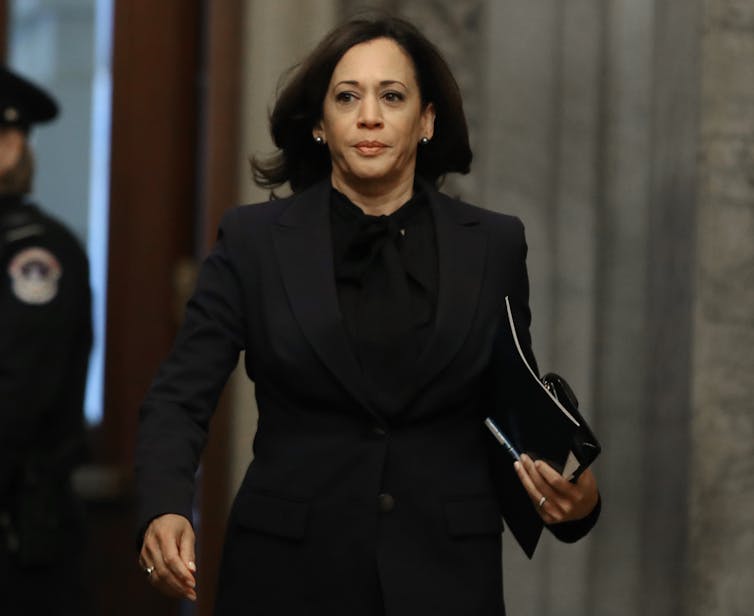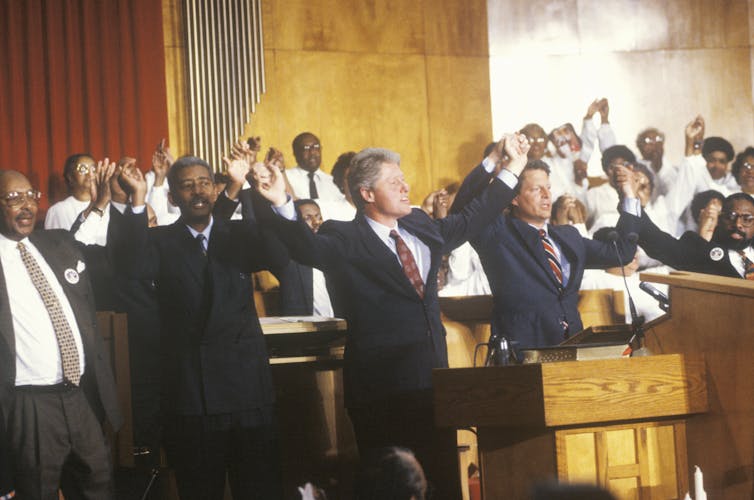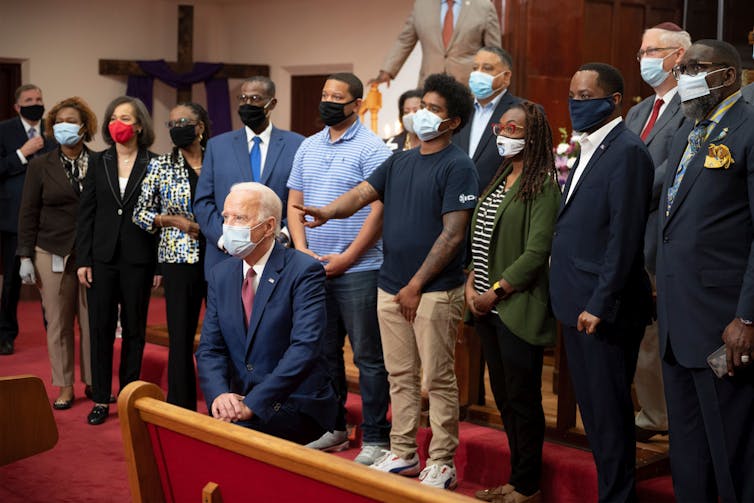With Harris pick, Biden reaches out to young Black Americans
- Written by Sam Fulwood III, Fellow, Center for Congressional and Presidential Studies, American University
With his choice of Sen. Kamala Harris as his running mate[1], Joe Biden may have helped bring young Black Americans to his side on Election Day.
Only 47%[2] of those Black Americans under 30 years old that we surveyed recently planned to vote for Biden, the presumed Democratic presidential nominee. But by picking Harris, a Black running mate, support for Biden jumps to 73% in this age group, which is a significant increase though still lower than other age groups.
Harris joining up with Biden may have made the Democratic ticket more attractive to younger Black Americans, who now comprise what we define as a critical set of swing voters.
But these aren’t your grandparents’ swing voters.
 Sen. Kamala Harris, arriving at the U.S. Capitol for the Senate impeachment trial of U.S. President Donald Trump, on January 31, 2020. Mark Wilson/Getty Images[3]
Sen. Kamala Harris, arriving at the U.S. Capitol for the Senate impeachment trial of U.S. President Donald Trump, on January 31, 2020. Mark Wilson/Getty Images[3]
No longer working-class whites
Most political analysts define “swing voters[4]” as those who swing their support from one party to the other between election cycles – determining winners and losers in the process.
According to this conventional wisdom, the “swingiest” voters are working-class whites[5] in the Midwest, who supposedly hold the keys to the White House[6].
Meanwhile, by contrast, pundits often portray Black Americans as an undifferentiated mass – loyal Democrat-supporting foot soldiers who will execute their mission for The Team on Tuesday as long as some preacher provides the right marching orders[7] on Sunday.
If these depictions have not already expired, they are certainly growing stale. Having studied electoral trends for decades[8], we can tell you that those undecided voters of the past are an endangered species[9] – in the Midwest and elsewhere. These days, the only choice that most Americans make – indeed, the choice that typically “swings” the election outcome – is whether to vote at all.
That brings us to the characterization of Black Americans as Democratic loyalists.
Our new survey[10] of 1,215 African Americans in battleground states – Wisconsin, Pennsylvania, Michigan, Florida, North Carolina and Georgia – reveals that while those over 60 remain among the most reliable of Democratic voters, and those between 40-59 are still pretty locked in as well, those under 30 (whom we oversampled to comprise half of our sample) are anything but.
 Black church members are seen as key to a candidate’s election victory; here, Governor Bill Clinton and Senator Al Gore attend service at the Olivet Baptist Church in Cleveland, Ohio during the Clinton-Gore 1992 campaign. Joe Sohm/Visions of America/Universal Images Group via Getty Images[11]
Black church members are seen as key to a candidate’s election victory; here, Governor Bill Clinton and Senator Al Gore attend service at the Olivet Baptist Church in Cleveland, Ohio during the Clinton-Gore 1992 campaign. Joe Sohm/Visions of America/Universal Images Group via Getty Images[11]
Not sold on Biden
Cathy Cohen, a professor of political science at the University of Chicago who studies Black youths’ political views, summed up this attitude in a recent podcast[12]: “They’ve seen the election of Black mayors, they’ve seen the election of the first Black president, and they’ve also seen that their lives have not changed.”
Not sold on voting
These young Black Americans may well sit things out in November, just as many of them did in 2016[13] when their behavior swung that election to Trump[14] as much as anything else did.
In our poll, 31%[15] of Black Americans under 30 say they probably won’t vote in this election. That may sound pretty good, given the average U.S. voter turnout of around 60% in recent elections[16].
But survey respondents of all stripes tend to wildly overestimate[17] their intention to vote. Indeed, about half[18] of our Black survey respondents under 30 say they don’t often vote because it “doesn’t make a difference,” providing a somewhat more realistic estimate of the percentage who will probably just stay home – and not search for a stamp to mail in their ballot, either.
And that number does not even take into account the turnout-depressing effects of voter suppression[19] efforts taking place across the country, the pandemic or the heavy distrust of mail-in voting that young Black people tend to express. Only 64%[20] of young people in our sample say they trust the state to report their vote accurately, and only 30%[21] say they plan to take advantage of mail-in voting.
 Biden is courting the Black vote – here, he’s at the Bethel AME Church in Wilmington, Delaware on June 1, 2020 – but fewer than half of young Black Americans surveyed in battleground states say they will vote for him. Jim Watson/AFP via Getty Images[22]
Biden is courting the Black vote – here, he’s at the Bethel AME Church in Wilmington, Delaware on June 1, 2020 – but fewer than half of young Black Americans surveyed in battleground states say they will vote for him. Jim Watson/AFP via Getty Images[22]
Not sold on the Democratic Party
Such cynicism on the part of young Black Americans is reflected in the lukewarm feelings they tend to have toward the Democratic Party more generally.
Only 47%[23] of them say that the party is welcoming to Black Americans, and only 43%[24] say they trust Democrats in Congress to do what’s best for the Black community. Perhaps most strikingly, unlike their older counterparts, only half[25] of those under 30 view the Democrats as any better than the Republicans on these scores.
[Deep knowledge, daily. Sign up for The Conversation’s newsletter[26].]
In both the survey responses and in the focus groups we conducted of young Black Americans in these same states, we heard repeated frustration toward what they view as a Democratic Party that expects their vote but doesn’t really do anything to deserve it other than claim to be “less racist” than the alternative.
As one of our focus group respondents put it, “I think at the end of the day, they all have the same agenda.”
In short, it appears that for Black America, the future is not necessarily “blue.” Electorally speaking, it is not necessarily anything at all. Moving forward, young Black Americans may be the real “swing voters”[27] in the only way that term really makes much sense anymore.
This is an updated version of an article[28] originally published on Aug. 5, 2020.
References
- ^ choice of Sen. Kamala Harris as his running mate (www.nytimes.com)
- ^ 47% (www.american.edu)
- ^ Mark Wilson/Getty Images (www.gettyimages.com)
- ^ swing voters (fivethirtyeight.com)
- ^ working-class whites (nymag.com)
- ^ keys to the White House (www.dataforprogress.org)
- ^ preacher provides the right marching orders (thehill.com)
- ^ studied electoral trends for decades (www.american.edu)
- ^ endangered species (www.stat.columbia.edu)
- ^ survey (www.american.edu)
- ^ Joe Sohm/Visions of America/Universal Images Group via Getty Images (www.gettyimages.com)
- ^ podcast (news.uchicago.edu)
- ^ many of them did in 2016 (www.brookings.edu)
- ^ swung that election to Trump (www.washingtonpost.com)
- ^ 31% (www.american.edu)
- ^ average U.S. voter turnout of around 60% in recent elections (www.fairvote.org)
- ^ wildly overestimate (www-jstor-org.proxyau.wrlc.org)
- ^ half (www.american.edu)
- ^ voter suppression (www.theatlantic.com)
- ^ 64% (www.american.edu)
- ^ 30% (www.american.edu)
- ^ Jim Watson/AFP via Getty Images (www.gettyimages.com)
- ^ 47% (www.american.edu)
- ^ 43% (www.american.edu)
- ^ half (www.american.edu)
- ^ Sign up for The Conversation’s newsletter (theconversation.com)
- ^ “swing voters” (www.theatlantic.com)
- ^ article (theconversation.com)
Authors: Sam Fulwood III, Fellow, Center for Congressional and Presidential Studies, American University
Read more https://theconversation.com/with-harris-pick-biden-reaches-out-to-young-black-americans-144336

